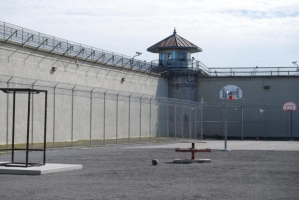The state of Georgia.
Sitting along the coast, right next to South Carolina and Florida, it is one of the hot bed for incarceration in the United States, the country with the highest number of prisoners per 100 000 people in the world (excluding the african country of Seychelles which has a population of just about 90 000).
As I documented before, living inside the walls of Georgia’s prisons is no pleasure. Inmates make it hard on themselves to remain sane. Everyday, the inner frustration in their mind get the better of them and they commit random acts of violence.
I watched Eugene Jarecki’s tremendously well written documentary “The House I Live In” and realized how important was the impact of a person’s past on his future with justice. A lot young kids raised in tough neighbourhoods grow up to have a difficult lifetime where living with a stash of weed under your bed or a gun around your waist is common.
Georgia capital and biggest city Atlanta was listed 8th on Business Insider‘s list of most dangerous city in the United States in 2012. Atlanta is a sort of microcosm of the state. Some say it’s a dangerous city to live in, others don’t think the same. It probably depends on which part of the city you live. Atlanta is known to be the city in America with the largest inequalities, ahead of cities like Miami, New York and Chicago. The city of San Fransisco holds the second spot on the list of cities with the biggest inequality but has a population nearly twice as big.
Based on a research by the Brookings Institution, a “a nonprofit public policy organization”, “the top 5 percent of households in San Francisco make more than $353,000 a year. In Atlanta, it’s about $280,000. But the bottom 20 percent? In San Francisco that income cutoff is $21,313. In Atlanta, that figure is about $6,500 a year less.”
A reason for such a high number of individuals with low income in the state could be due to the fact that there are so many probationers. Finding a job while on probation is a hard task because you need to declare it when filing an application and chances are, whoever is looking at your application may not even look at your resume if you’ve been convicted. Even if you have a degree, it can be tough. You end up returning in the spiral of doing second hand jobs or selling drugs which can lead you right back to prison.
Georgia has a astonishing ratio of 6 829 probationers per 100 000 person. The state with the closest ratio is Ohio with 2 802 per. Georgia’s rate is 362% higher than the national average. But since companies benefit from probationers, helping out the state’s economy, it doesn’t seem like the state is in any rush of changing their policies.
Sentinel Offender Services, the biggest company of it’s kind in Georgia, is based in California but operates mostly in Georgia. It was stated as one as a “Major Player” in the Humans Right Watch report named “Profiting from Probation”. The company operated in Los Angeles County in 1995, just a couple years after the Los Angeles riots at a time when the nation’s second biggest city was in crisis and revolt. This shows that the company has received the trust from important cases. Sentinel provided “tactical services” for the Los Angeles County Probation Department.
Probationers have to pay monthly fees to companies such as Sentinel Offender Services along with the additional fees for the monitors they have to wear on their ankle. The Georgia Department Management stays passive and simply writes that the GPS is “used best” for “sex offenders”, “domestic violence cases”.
Sentinel was under scrutiny in November 2014 when Georgia’s Supreme Court declared that tracking down “misdemeanour offenders” was constitutional but not to extend the probationer’s sentence. Private companies make a lot of money since they supervise close to 80% of all probationers. One of the reasons to explain why there is so many of them is because Georgians can be “placed on probation simply to give them time to pay off traffic fines they couldn’t afford on the day they went to court”.
But if you can’t pay the privately-owned company making tons of money of your back, you can be back in prison. The Nation published a report in early August 2014 describing how many Georgians end up in prison simply they are too poor to pay their bills for cases as stupid as traffic offenses. Since 2000, when the state eliminated “county-run misdemeanour probation”, the private companies revenues exploded.
This shows how complicated the state’s correctional system is and how it affects the state’s economy. While politicians will support the safety of all and to condemn people for violence, the economic benefits of putting a monitor on an individual are so huge that they don’t care, so much. It’s similar to the tobacco industry. Nicotine companies profit so much of people smoking that they even though they encourage people to stop smoking, they don’t really wan’t you too because they wan’t to fill up their pockets.
Pockets full of money, and peaches.

